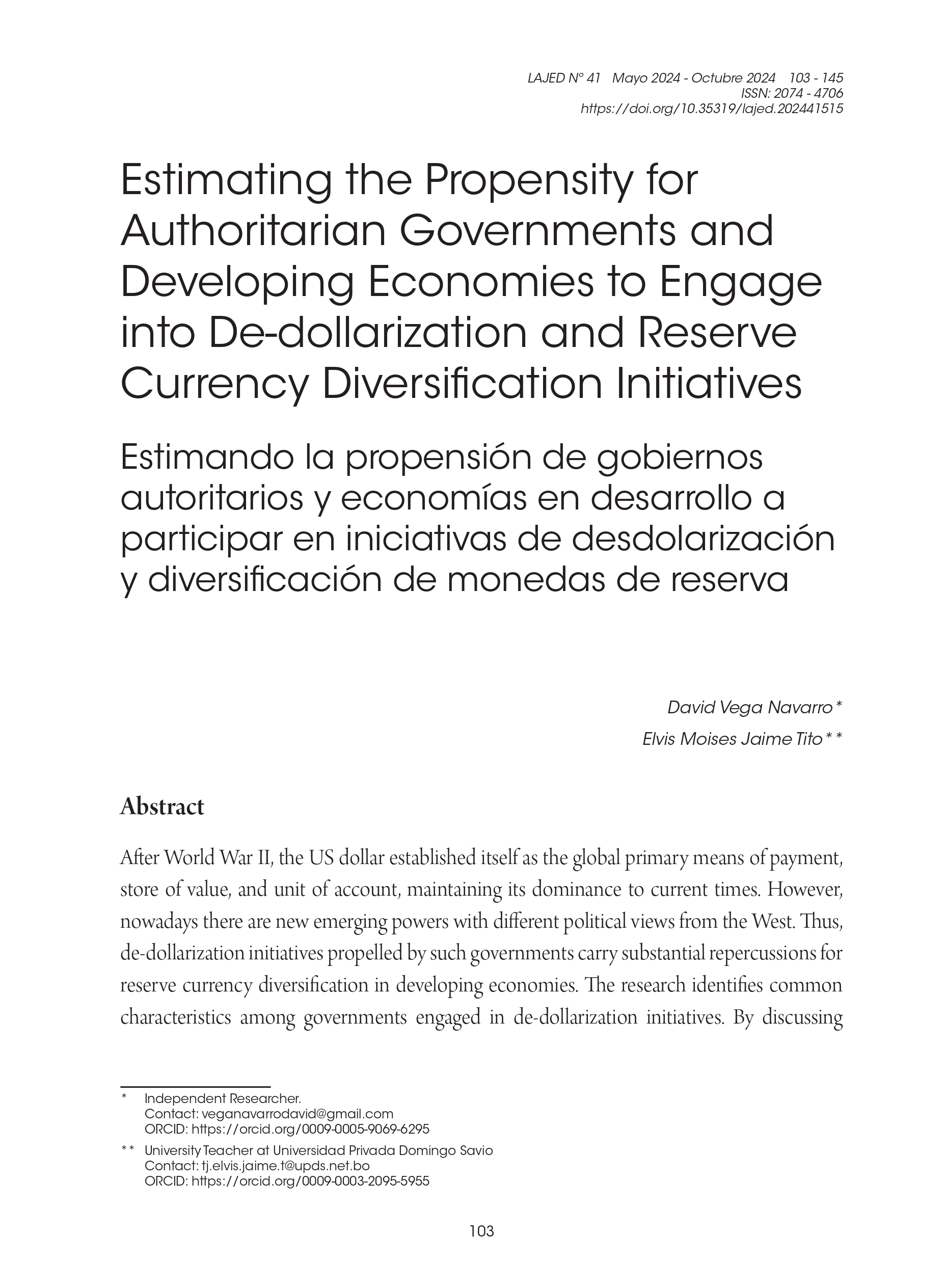Estimating the Propensity for Authoritarian Governments and Developing Economies to Engage into De-dollarization and Reserve Currency Diversification Initiatives
DOI:
https://doi.org/10.35319/lajed.202441515Keywords:
De-dollarization, reserve currency, authoritarianism, financial sanctionsAbstract
After World War II, the US dollar established itself as the global primary means of payment, store of value, and unit of account, maintaining its dominance to current times. However, nowadays there are new emerging powers with different political views from the West. Thus, de-dollarization initiatives propelled by such governments carry substantial repercussions for reserve currency diversification in developing economies. The research identifies common characteristics among governments engaged in de-dollarization initiatives. By discussing their incentives, mainly associated with political risks, the research assesses how authoritarian governments are propense to increasing their use of non-traditional reserve currencies. The empirical results, derived from cross-sectional probit regressions, show that governments expressing the intention of reducing US dollar use for international payments display links with higher authoritarianism, capital controls, political closeness with BRICS countries in the United Nations General Assembly, and reliance on China as a major trade partner.
Downloads
References
Angrist, J. D., & Pischke, J. S. (2009). Mostly harmless econometrics: An empiricist’s companion. Princeton university press.
Arslanalp, S., Eichengreen, B., & Simpson-Bell, C. (2022). The Stealth Eroson of Dollar Dominance: Active Diversifiers and the Rise of Nontraditional Reserve Currencies. International Monetary Fund. Working Paper, (2022/058), 24.
Burnell, P., & Calvert, P. (1999). The resilience of democracy: An introduction. Democratization, 6(1), 1-32.
Economist Intelligence Unit (2022). Democracy Index 2022: Frontline democracy and the battle for Ukraine. London: Economist Intelligence Unit.
Eichengreen, B. (2011). Exorbitant privilege: The rise and fall of the dollar and the future of the international monetary system. Oxford University Press.
Eichengreen, B. (2022). Sanctions, SWIFT, and China’s Cross-Border Interbank Payments System. Center for Strategic & International Studies. (https://www.csis.org/analysis/sanctions-swift-and-chinas-cross-border-interbank-payments-system ) (Accessed: 27.01.2024)
Gourinchas, P. O. (2019). The dollar hegemon. In Evidence and implications for policy makers. 6th Asian Monetary Policy Forum.
Graham, N. & Tran, H. (2024). de-dollarization is not just geopolitics, economic fundamentals matter. Atlantic Council. (https://www.atlanticcouncil.org/blogs/econographics/sinographs/dedollarization-is-not-just-geopolitics-economic-fundamentals-matter/ ) (Accessed: 28.01.2024)
Horii, A. (1986). The Evolution of Reserve Currency Diversification. BIS Economic Paper no. 18.
Iancu, A., Anderson, G., Ando, S., Boswell, E., Gamba, A., Hakobyan, S. & Wu, Y. (2022). Reserve Currencies in an Evolving International Monetary System. Open Economies Review, 33(5), 879-915.
Ilzetzki, E., Reinhart, C. M., & Rogoff, K. S. (2019). Exchange arrangements entering the twenty-first century: Which anchor will hold? The Quarterly Journal of Economics, 134(2), 599-646
Ilzetzki, E., Reinhart, C. M., & Rogoff, K. S. (2020). Why is the Euro Punching Below Its Weight? Economic Policy, 35(103), 405-460.
Ito, H., & McCauley, R. N. (2020). Currency composition of foreign exchange reserves. Journal of International Money and Finance, 102, 102104.
Ize, A., & Yeyati, E. L. (2006). Financial de-dollarization: is it for real? Financial dollarization: the policy agenda, 38-63.
Jin, Emily. (2022). Why China’s CIPS Matters (and Not for the Reasons You Think). Lawfare, April 5, 2022.
Kubo, K. (2017). Dollarization and de-dollarization in transitional economies of Southeast Asia: an overview. Dollarization and De-dollarization in Transitional Economies of Southeast Asia, 1-31.
Levy-Yeyati, E. (2021). Financial dollarization and de-dollarization in the new millennium. Latin American Reserve Fund Working Paper.
Liu, Z. Z., & Papa, M. (2022). Can BRICS De-dollarize the Global Financial System? Cambridge University Press.
Lubik, T. (2021). Government Debt and Deficits: Does the U.S. Spend Beyond Its Means. (https://www.richmondfed.org/podcasts/speaking_of_the_economy/speaking_20210730_lubik_part1 ) (Accessed 27.01.2024).
McDowell, D. (2023). Bucking the Buck: US Financial Sanctions and the International Backlash Against the Dollar. Oxford University Press.
Neely, C. J. (2023). The Rise and Fall of M2. Economic Synopses, No. 11. (https://doi.org/10.20955/es.2023.11 ) (Accessed 10.01.2024)
Norrlöf, C. (2022). Will Economic Statecraft Threaten Western Currency Dominance? Sanctions, Geopolitics, and the Global Monetary Order. Atlantic Council. (https://www.atlanticcouncil.org/in-depth-research-reports/issue-brief/will-economic-statecraft-threaten-western-currency-dominance-sanctions-geopolitics-and-the-global-monetary-order/ ) (Accessed: 11.01.2024)
Nye, J. S. (2023). Soft Power and Great-Power Competition: Shifting Sands in the Balance of Power Between the United States and China.
Office of Foreign Assets Control. (2023). Sanctions programs and country information. (https://ofac.treasury.gov/sanctions-programs-and-country-information ) (Accessed: 21.11.2023)
Pepinsky, T. B. (2007). Financial Crises, Capital Controls, and Authoritarian Breakdowns.
Rosen, Phil. (2022). China is Buying Russian Energy with its Own Currency, Marking the First Commodities Paid for in Yuan since Western Sanctions Hit Moscow. Markets Insider, April 7, 2022. https://markets.businessinsider.com/news/commodities/dollar-vs-yuan-china-buys-russian-oil-coal-ukraine-sanctions-2022-4 . (Accessed: 04.01.2024)
Sosa, M. S., & Garcia-Escribano, M. M. (2011). What is Driving Financial De-dollarization in Latin America? International Monetary Fund.
Voeten, E. (2013). Data and analyses of voting in the United Nations: General Assembly. Routledge handbook of international organization, 54-66.
Wagdi, O., Elnahrawy, A., & Fathi, A. (2023). Petrodollar and De-dollarization: A Survey from OAPEC Countries. In E3S Web of Conferences (Vol. 449, p. 02008).
Yelery, A. (2016). China’s Bilateral Currency Swap Agreements: Recent Trends. China Report, 52(2), 138-150.

Downloads
Published
How to Cite
Issue
Section
License
Copyright (c) 2024 Latin American Journal of Economic Development

This work is licensed under a Creative Commons Attribution-NonCommercial 4.0 International License.





